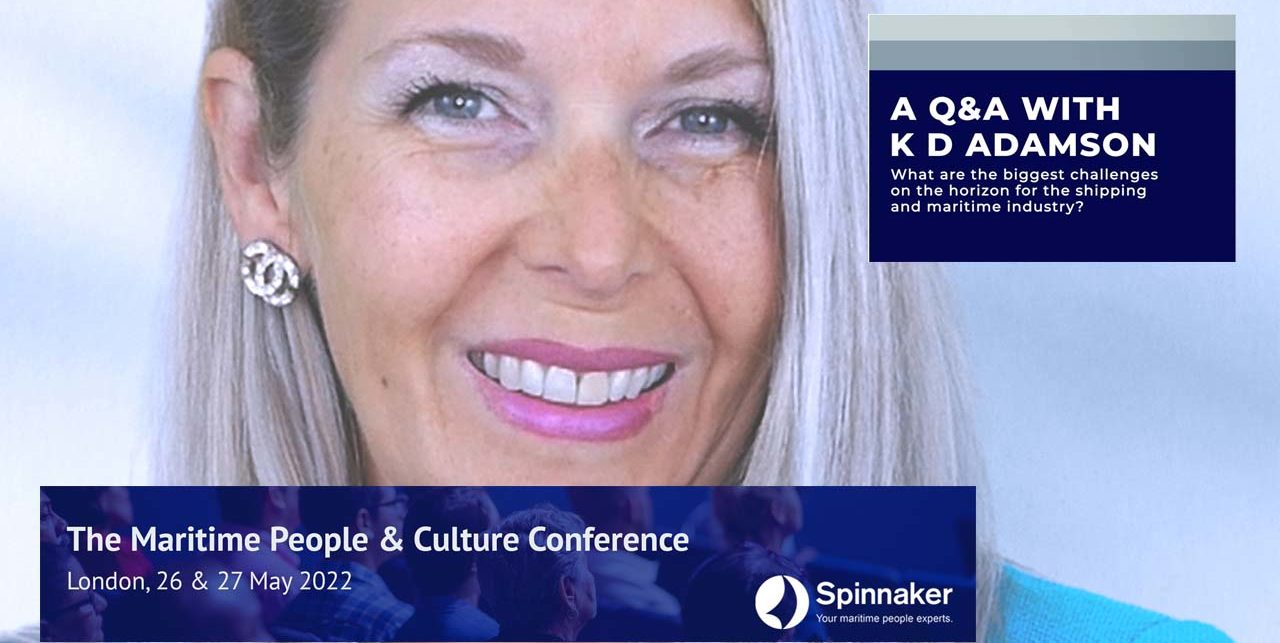Changing Course
Share this blog
Latest Maritime Vacancies
Client Executive
Technical Superintendent (Dry) – Europe
Tanker Technical Superintendent – Europe
HSSEQ Superintendent – Europe
Fleet Manager (Dry) – Europe
What are the biggest challenges on the horizon for the shipping and maritime industry? A Q&A with K D Adamson.

Ahead of the 2022 Spinnaker Maritime People & Culture Conference we sat down with our keynote and special guest, shipping’s most famous futurist, K D Adamson.
One of the most sought-after futurist speakers globally K D Adamson’s keynotes have been likened to a TED talk on steroids.
With a stellar client list K D has advised organisations in multiple industries from the largest companies to start-ups, and is expert in ESG, agility, leadership, technology, digital and organisational transformation, and the Blue, Green and Circular Economies.
As the world’s foremost maritime futurist her client list spans the ocean industries, and she is renowned for combining visionary thinking, foresight and insight with sharp, straight-talking commercial and business acumen & expertise.
As futurist-in-residence at Futurenautics she works with ship owners, operators & managers, maritime suppliers, policymakers, regulators, technology companies, charities, class, NGOs, banks, VC, port and logistics groups.
With such a broad view of the business future we asked her what she saw as the biggest challenges on the horizon for the shipping and maritime industry?
K D Adamson: Shipping is what’s described as a ‘harder to abate’ industry so when it comes to the energy transition it’s facing some specific challenges, and they are very significant. But shipping is also going to have to deal with a set of issues which have the potential to fundamentally reshape business itself, not just the shipping and maritime industry, and actually the fact that these issues are affecting every type of business gives you a steer about how we can solve them: the mindset we need to adopt in order to address them, which is to collaborate across our ecosystems.
That’s because whatever business you’re in the expectations of your stakeholders are broadly changing, so that could impact pretty much everything from how products and assets are designed, how materials are sourced, how we manufacture and build things, where we build them, how we recycle them, and of course how we transport them, because in future businesses are going to have to start pricing in the externalities of their operations, how they produce their products and services, quantifying the impacts they cause on stakeholders, societies and the environment etc., in order to make their profits,
And that’s never happened before, so I think it’s hard to overstate just how far-reaching this shift is going to be for businesses generally. But there’s an added layer of complexity for multi-national organisations, global industries like shipping, because they operate across national jurisdictions. I know many people aren’t fans of IMO, but the one thing it has managed to do for fifty-plus years is create a global compliance regime which has allowed ship operators and their vessels to trade anywhere in the world. Now when we talk about stakeholder expectations changing, it’s important to remember that those changes aren’t happening uniformly around the world. There are very different views within national and regional stakeholders about how companies should and should not behave, and that’s already filtering through into new legislation, which is really fragmenting the operating environment.
So, for those businesses which have global operations, which are part of global value and supply chains and critically, have globally and culturally diverse employees, securing what we refer to as a societal license to operate, is going to be a moving target. That’s because they will be faced with increasingly conflicting expectations and priorities from everyone from governments and political movements, environmental groups, lenders and insurers to customers, end consumers and employees. And in order to manage that successfully shipping and maritime companies must have a very comprehensive understanding of where and how they are going to transform their businesses to create sustainable long-term growth and value in the future, and, critically, a very clear roadmap for how they’re going to implement that sustainable transformation.
You can watch the video to accompany this interview with K D Adamson by following this link
The conference takes place on Thursday 26th & Friday 27th May in the City of London, so follow this link now to view the full agenda and book tickets.